Forming a musical bond is a bit like making a good friend. You often can’t explain exactly why you hit it off: You just do. And when this rare harmony descends upon a conductor and an orchestra, angels rejoice.
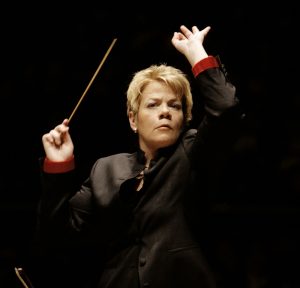
Marin Alsop / Photo by Grant Leighton
“It’s a matter of timing and chemistry… sort of like the stars aligning,” said Marin Alsop of her hugely successful tenure with the São Paulo Symphony Orchestra (OSESP), where she was music director from 2013 to 2019 and now serves as Conductor of Honor. “And I think it is a kind of similar situation to that of great relationships, whether they’re friendships or romantic relationships: You just click. ‘Gosh, I feel like I’ve known you guys forever.’ ”
Marin spoke to us recently from São Paolo, where she was preparing the Brazilian orchestra for a United States tour that includes a concert on the Harriman-Jewell Series (October 10th, Helzberg Hall), a performance in Bethesda, Maryland, and the orchestra’s Carnegie Hall debut.
The road to this crucial juncture began in 2009, when a friend coaxed Marin to guest-conduct in Brazil’s vibrant financial center, which boasts a population of 12.5 million people (set within a vast metropolitan region of some 22.5 million inhabitants).
“I came here knowing nothing about Brazil, and I thought, What am I doing in this crazy megalopolis?” Her first answer came when she visited Sala São Paulo, a grandiose wing of a still-functioning train station that has been converted into one of the most admired, visually stunning concert halls in the world.
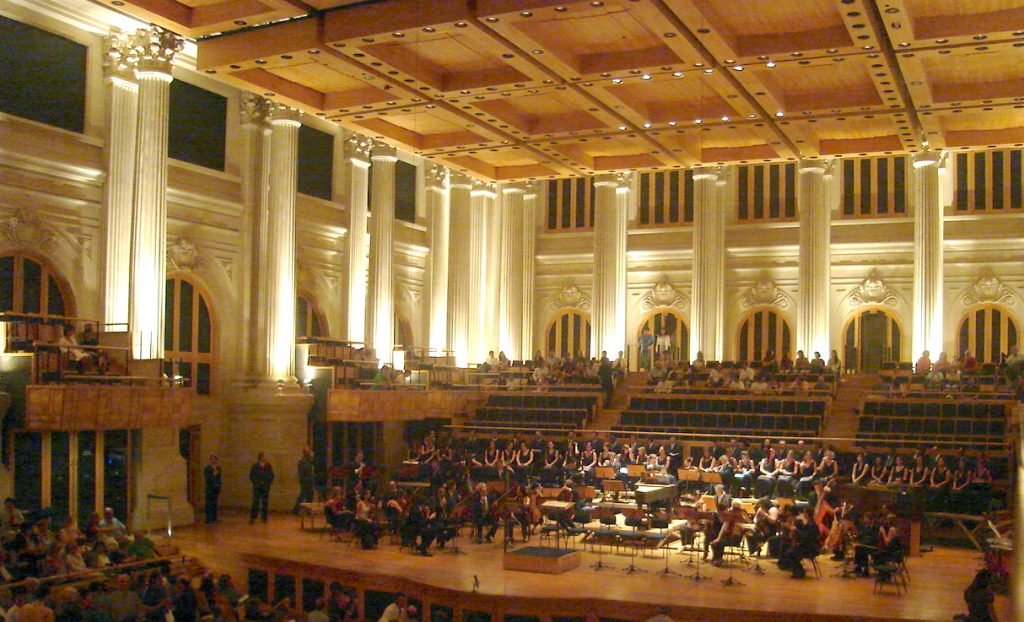
Sala São Paulo, located in the city’s Júlio Prestes Train Station, was renovated extensively by the São Paulo State Government and opened as a concert hall in 1999. / Photo by Luís Guilherme Fernandes Pereira
“Then I met this fabulous orchestra, who really wanted to be great,” she said. “And that just ticked every box for me: They’re passionate, they’re fun, they’re warm, they’re good musicians, they have high aspirations. It just really ‘clicked’ in so many ways, and it still does.”
The tour has special significance for the Brazilians, as they celebrate the bicentennial of their nation’s independence in 2022. And it comes at a time when they are playing at probably their highest level since the ensemble’s founding in 1954.
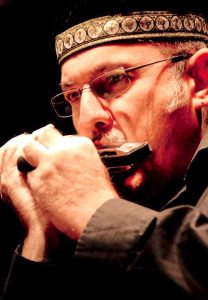
Brazilian-born José Staneck is one of a handful of harmonica virtuosos in the world.
“Early on, when I asked them, What do you guys want to do? What can I help you with?” Marin said. The answer was simple: They wanted to play Carnegie Hall. “I said, I can try,” she told them “but it might take a little while.”
Fast-forward to the planning of the current season, when Carnegie Hall invited Marin to conduct there and asked which of the orchestras she is associated with she would like to bring with her. The Vienna Radio Symphony? The Baltimore Symphony? One of the London orchestras?
“I thought: I have to bring São Paulo,” she said. “They’re the ones who put the stake in the ground. So this is kind of the culmination of our first chapter together.”
From the get-go, the Brazilians “had big dreams,” she said. “I was able to open some doors for them, and they were able to provide resources to support those projects.” As she has grown fond of these musicians, they are happy to take their place alongside the world’s most prominent orchestras: thanks partly to a dynamic staff and board but also to Marin’s special touch.
“I feel comfortable with Marin’s conducting, and that’s very important,” said Harpist Liuba Klevtsova in The Conductor, Bernadette Wegenstein’s award-winning documentary on Marin’s life and career. “I understand her language. I understand her gestures. And I understand what she wants to say.”
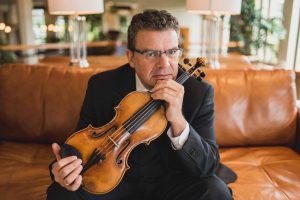
Emmanuele Baldini / Photo by Fernando Ruz
The collaboration has included a decade of performances, world tours, and recordings that include a Prokofiev Symphony cycle, music of Leonard Bernstein, and a soon-to-be-released Mahler cycle on video.
“I think the main contribution by Marin was to give this orchestra the sense that they are good, and this is very important,” said former Brazilian President Fernando Henrique Cardoso, an avid music lover, in the documentary. “And now it’s fascinating to see how they play!”
Marin’s has been a career of firsts: She was the first woman to be mentored by Bernstein, the first female music director of a major American orchestra (the Baltimore Symphony), the first woman to conduct at La Scala, the first to lead a Viennese orchestra.
In her youth, Main was continually surprised by entrenched attitudes in the conducting world that “girls can’t do that,” as one of her teachers told her. When the Juilliard School of Music awarded her with an honorary doctorate in 2021, she drew laughter by reading one of several rejection letters the School had sent her early on.
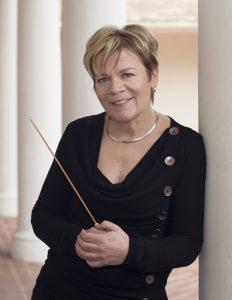
Photo by Adriane White
It is no exaggeration to say that Marin’s perseverance is one of the reasons women have gained footing in today’s conducting world. And as orchestra rosters edge toward a 50-50 male-female ratio, she would “like to see… the conducting staff and guest-conductor numbers approach 50-50, too.”
The Harriman-Jewell Series appearance marks both Marin’s local debut and that of the São Paulo ensemble. It also features the local premiere of Heitor Villa-Lobos’ Harmonica Concerto (with soloist José Staneck), in a program that also includes Rimsky-Korsakov’s Scheherazade (with Concertmaster Emmanuele Baldini as soloist).
“São Paulo is one of the biggest cities in the world, yet we don’t hear much about it,” said Harriman-Jewell Series Director Clark Morris. “I hope that this program piques people’s interest in Brazil and its position in the world: that it opens eyes and ears to that culture and expands our world-view.”
Villa-Lobos and Rimsky-Korsakov might seem worlds apart, but this program is about “cultural identity through narrative,” Marin said. “These are both composers of great flair… and unmistakably from the region they were born in. Rimsky-Korsakov is Russian through and through, and Villa-Lobos’ ‘Brazilianness’ is always present.”
—By Paul Horsley
For tickets, call 816-415-5025 or see hjseries.org. To reach Paul Horsley, performing arts editor, send an email to paul@kcindependent.com or find him on Facebook (paul.horsley.501) or Twitter/Instagram (@phorsleycritic).